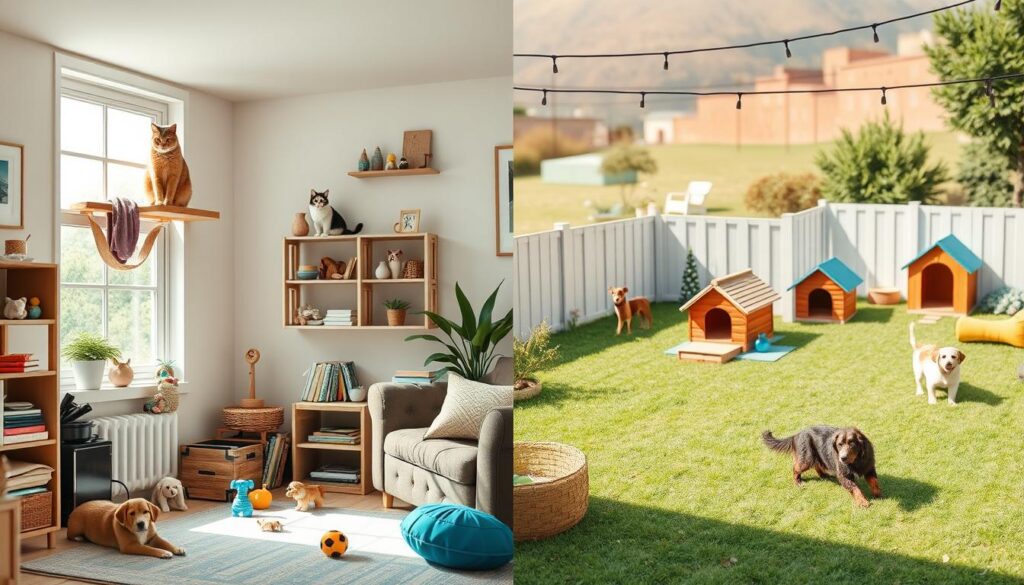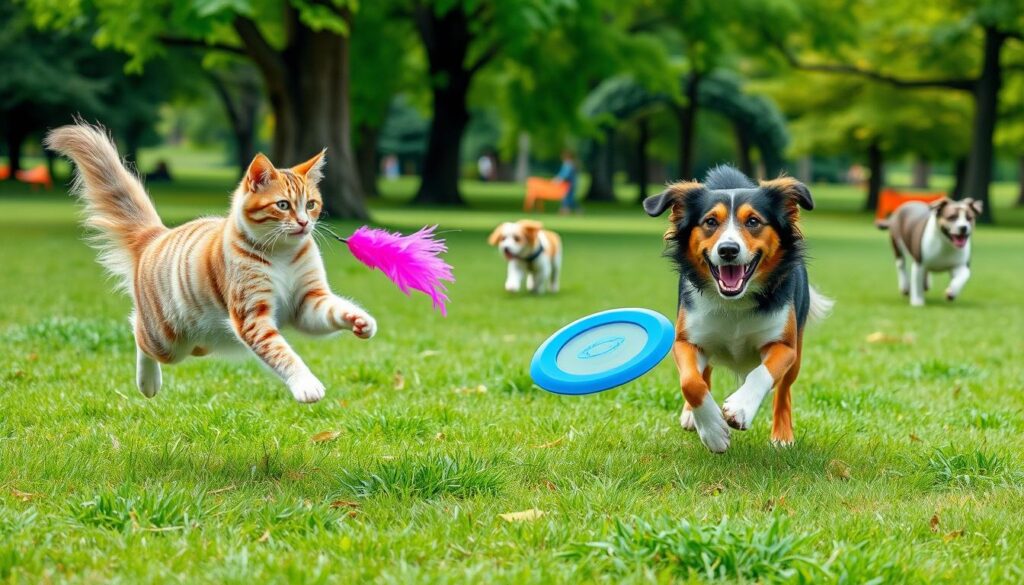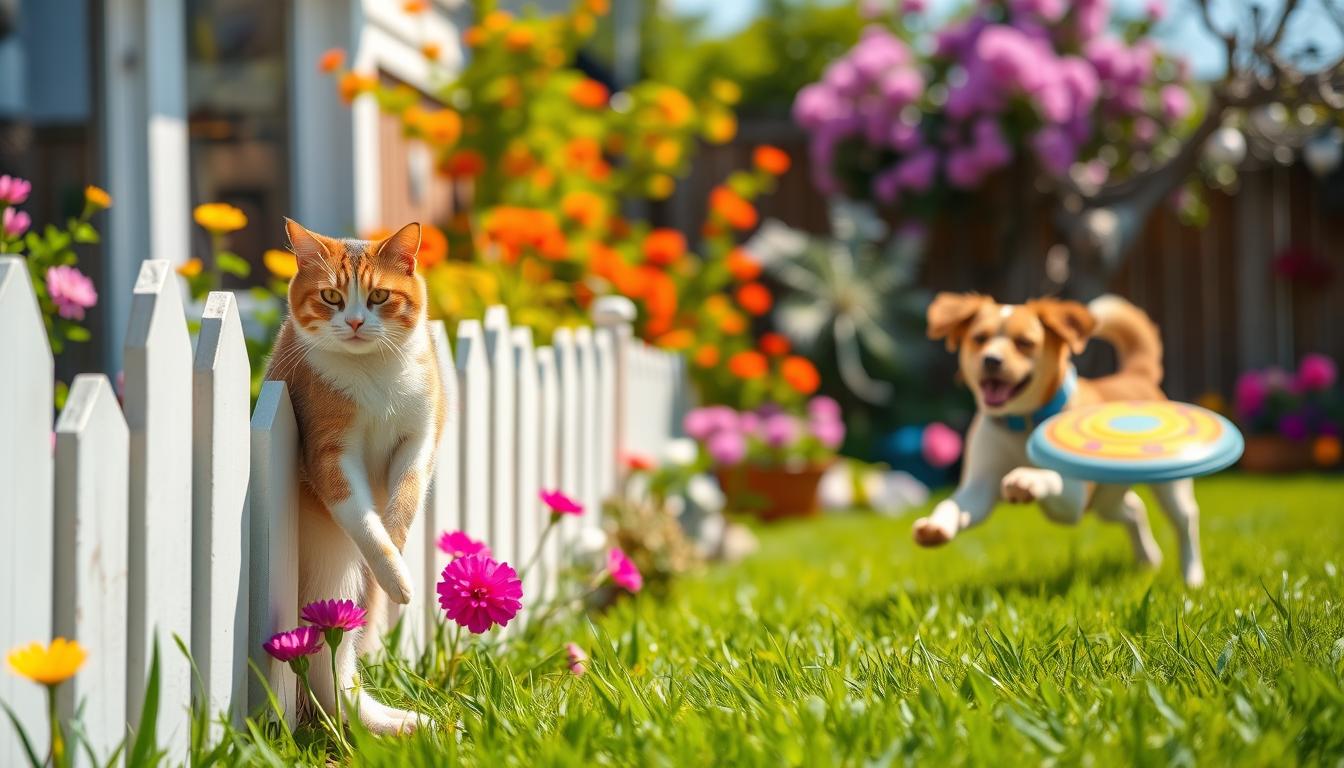Cats vs Dogs Are you deciding between a cat’s charm and a dog’s energy? Choosing the right pet is tough because both have unique traits and needs. This guide will help you understand the differences between cats and dogs. This way, you can pick the pet that fits your life best.
Key Takeaways
- Understand the time commitment and daily care needs of cats and dogs
- Evaluate the financial considerations, including initial costs and ongoing expenses
- Assess the space requirements and living arrangements suitable for each pet
- Explore the training and behavioral differences between felines and canines
- Discover the social needs and interaction patterns of cats and dogs
Understanding Pet Ownership Responsibilities
Getting a pet is a joy, but it also means taking on big responsibilities. Whether you want a cat or a dog, knowing the time, money, and space needed is key.
Time Commitment and Daily Care
Looking after a pet takes a lot of time. Dogs need walks, play, and lots of attention. Cats might need less time but still need daily care like feeding and grooming. Owners must be ready to spend a lot of time on their pet’s needs.
Financial Considerations
- Initial adoption or purchase costs
- Ongoing expenses for food, supplies, and vet visits
- Potential emergency vet bills
- Grooming and boarding costs
Being a responsible pet owner means spending money. The cost can change based on the pet, its breed, and any special needs. It’s important to plan and budget for these expenses before getting a pet.
Living Space Requirements
The size and layout of your home affect your pet’s happiness. Cats do well in smaller places, while dogs need more room. Think about what your pet needs when choosing where to live.
| Consideration | Cats | Dogs |
|---|---|---|
| Space Requirement | Smaller spaces are okay for cats | Dogs need more room to play and move |
| Outdoor Access | Cats are happy indoors with toys and stimulation | Dogs need to go outside for exercise and to go to the bathroom |
| Noise Level | Cats are usually quieter | Dogs can be louder and may need soundproofing |
Knowing what pet ownership entails helps you choose the right pet for you. Whether it’s a cat or a dog, it should fit your lifestyle and what you can handle.
Cats vs Dogs: Basic Personality Differences
Choosing between a cat or dog as a pet requires knowing their typical traits. This helps you pick the right pet for your lifestyle and preferences.
Cats are generally more independent, happy to play alone for a long time. They like to interact when they want to. Dogs, however, are more affectionate and socially dependent. They always want to be with their owners and seek attention.
Cats and dogs also act differently around people. Dogs are more outgoing and eager to interact with everyone. Cats are more reserved and selective in their social interactions. This is important if you’re busy or have lots of visitors.
Dogs show love in big ways, like with kisses and wagging tails. Cats show love in smaller ways, like with head butts or purrs.
Knowing these differences helps you choose the right pet. The decision between a cat or dog is personal. It’s about finding the pet that fits your life and personality best.
Cost Comparison Between Cats and Dogs
Thinking about getting a pet? The money you’ll spend is a big deal. Cats or dogs, knowing the costs helps you choose wisely. Let’s look at the main differences in costs for cats and dogs.
Initial Purchase or Adoption Fees
Getting a pet starts with a big expense. Adopting a cat costs $50 to $200. But, a purebred kitten can be $500 to $1,000. Dogs are a bit pricier, with adoption fees from $100 to $500. Purebred puppies can cost $500 to $2,000 or more.
Ongoing Medical Expenses
Regular vet visits are key for pets. Cats need $200 to $400 a year for vet care. Dogs cost more, with $400 to $800 a year.
Food and Supply Costs
Dogs
| Item | Cats | |
|---|---|---|
| Food | $20 – $60 per month | $30 – $100 per month |
| Litter/Bedding | $10 – $20 per month | N/A |
| Toys/Accessories | $10 – $30 per month | $20 – $50 per month |
The table highlights the monthly costs for food, litter, and toys. These costs can quickly add up. So, it’s crucial to include them in your budget for owning a pet.
Space Requirements and Living Arrangements
Choosing between a cat or a dog as a pet depends on your living space. Cats and dogs need different amounts of space. Knowing these needs helps you pick the right pet for your home.
Apartment Living: Cats vs. Dogs
Cats are better for apartment dwellers. They’re happy with a small indoor area, as long as they have food, water, litter, and scratching posts. Dogs, especially big ones, need more room and can find apartments too small.
Outdoor Access and Yard Size
Dogs love being outside, whether it’s a yard or a park. They need to run and explore, which is easier in a house with a yard. Cats enjoy going outside too, but they get enough exercise indoors.
| Feature | Cats | Dogs |
|---|---|---|
| Ideal Living Space | Apartment or smaller home | House with backyard |
| Outdoor Access | Optional | Highly Recommended |
| Yard Size | Not a necessity | Larger the better |
Choosing between a cat or a dog depends on your home, preferences, and what you can offer your pet. Think about these things to pick the best pet for your life and home.

Training and Behavioral Considerations
Choosing a pet means understanding their training and behavior needs. Cats and dogs have different needs. Knowing these differences helps pick the right pet for you.
Dog Training Basics
Dogs are easy to train, and it’s key for their happiness and your home’s peace. Teaching them basic commands like sit and stay is important. Use positive methods and be patient for the best results.
Cat Behavioral Management
Cats are independent and may not follow traditional training. But, you can still manage their behavior. Teach them to use the litter box and provide scratching posts. Redirect bad behaviors to better ones.
Common Training Challenges
- Housebreaking and potty training
- Leash walking and socialization
- Curbing unwanted behaviors like barking or scratching
- Acclimating cats to new environments and routines
Choosing a cat or dog means understanding their unique needs. Proper training leads to a happy, well-behaved pet. Spend time and effort to get the best results.
Exercise and Activity Requirements
The cats vs dogs debate often focuses on their exercise needs. Both pets can bring joy and companionship. Yet, their activity requirements differ a lot.
Dogs need daily walks to stay happy and healthy. They love to explore and play. The amount of exercise needed varies by breed. Some dogs, like Labradors, need a lot, while others, like Pugs, need less.
Cats, however, are more independent. They enjoy short play sessions and exploring. They don’t need as much structured pet exercise needs as dogs. But, they still need regular playtime and places to scratch and climb.
| Characteristic | Cats | Dogs |
|---|---|---|
| Exercise Needs | Moderate, with bursts of playtime | High, requiring daily walks and active play |
| Ideal Exercise Duration | 15-30 minutes per day | 30 minutes to 2 hours per day, depending on breed |
| Exercise Activities | Chasing toys, climbing, scratching | Walking, running, fetching, agility training |
Choosing between a cat or a dog depends on your lifestyle. Make sure you can meet your pet’s pet exercise needs. Proper exercise is key for their health and happiness.

Social Needs and Interaction Patterns
Understanding the social needs of pets is key for pet owners. Dogs and cats have different personalities and social needs. They need interaction with humans and other pets.
Dog Social Requirements
Dogs love being around people and forming close bonds. They can get anxious if left alone for too long. Dogs enjoy playing with other dogs and may need a dog friend or regular playdates.
Daily walks, interactive toys, and training sessions meet a dog’s social needs.
Cat Independence Levels
Cats are more independent and don’t need as much social interaction as dogs. They enjoy human company but are okay with being alone. Are male cats easier for dog to get along with, as they might be more patient with dogs.
Family Integration
Integrating a cat or dog into a family is important. Dogs usually adapt well to different family setups and love being around kids. Cats prefer a quieter, more stable home environment.
Knowing how cats and dogs interact helps choose the right pet for your family. This ensures a happy and harmonious pet-owner relationship.
Health Care and Grooming Needs
As pet owners, knowing the health care and grooming needs of cats and dogs is key. Whether you’re thinking of a cat or a dog, being informed is vital. It helps keep your pet happy and healthy for a long time.
Cats vs Dogs: Vaccination and Veterinary Visits
Cats and dogs both need regular vet visits and shots to stay healthy. But, the type and frequency of these can differ. Dogs often need more shots and vet visits than cats.
Cats might need fewer vaccinations but still need regular check-ups. This preventive care is crucial for their health.
Grooming Routines: Felines vs Canines
Grooming needs vary between cats and dogs. Cats usually groom themselves well, needing only occasional brushing. This helps keep their fur healthy and shiny.
Dogs, however, need more grooming. They require regular brushing, baths, and sometimes professional grooming. This keeps their fur looking great.
| Health Care Aspect | Cats | Dogs |
|---|---|---|
| Vaccination Schedule | Less frequent | More frequent |
| Veterinary Visits | Routine check-ups | More regular visits |
| Grooming Needs | Self-grooming, occasional brushing | Regular brushing, bathing, and professional grooming |
Understanding the grooming and health needs of cats and dogs helps you choose the right pet. This ensures your furry friend stays happy and healthy.
Travel and Pet Care Options
Traveling with your pet can be a big deal, whether you have a cat or dog. It’s important to think about how to keep your pet comfortable and happy when you’re away. Let’s look at the best ways to make sure your pet is okay while you’re traveling.
Traveling with Pets
Traveling with your pet can be fun, but it needs a lot of planning. Airlines have rules for pets, so knowing these is key. Some airlines let small pets in the cabin, while others need them to be checked as cargo.
Hotels and vacation rentals also have rules about pets. It’s important to check these rules before booking. This way, you can make sure your pet is welcome where you’re staying.
Pet Sitting Solutions
If you can’t take your pet with you, finding a good pet sitter is crucial. Pet travel considerations include more than just who will take care of them. You also need to think about their safety and happiness.
Professional pet sitters can give your pet the care they need in your home. They can feed, exercise, and even give medicine. Or, you can choose a boarding facility for a safe and structured place for your pet.
| Traveling with Pets | Pet Sitting Solutions |
|---|---|
|
|
Choosing between cat v.s dog when it comes to travel and pet care can be tough. But with the right info and planning, you can make sure your pet is happy and you’re at ease.
Environmental Impact and Sustainability
Choosing between a cat or a dog means thinking about how they affect the environment. Both cats and dogs leave their mark on the planet in different ways. Knowing these pet environmental impact factors helps you choose wisely and care for the planet.
Dogs tend to have a bigger carbon footprint than cats because they are larger and eat more. Also, dealing with dog waste can pollute the environment.
| Environmental Factor | Cats | Dogs |
|---|---|---|
| Carbon Footprint | Smaller | Larger |
| Waste Management | Easier to dispose of litter | Larger volume of waste, more challenging disposal |
| Resource Consumption | Typically consume less food and water | Require more resources for food and larger living space |
To lessen your pet’s environmental impact, think about adopting from a local shelter. This helps reduce the need for breeding. Also, choose eco-friendly pet supplies and a diet that’s kinder to the planet.
By learning about the environmental impact of cats vs dogs and adopting green pet practices, you can make your pet a planet-friendly addition to your family.
Lifestyle Compatibility Assessment
Choosing between cats and dogs needs careful thought. Your lifestyle and personal likes are key. Your work and family life affect which pet fits best into your home.
Work Schedule Considerations
If you work long hours or travel a lot, a cat might be better. Cats are independent and don’t need constant attention. They’re great for busy people or families.
Dogs, on the other hand, need lots of time and attention. They’re best for those with flexible schedules or who stay home.
Family Dynamic Factors
Your family’s size and makeup matter too. Families with young kids might prefer dogs for their playfulness. Cats, however, can be calmer and better for a peaceful home.
Also, think about how a new pet will get along with your current pets. This is crucial for a harmonious household.

